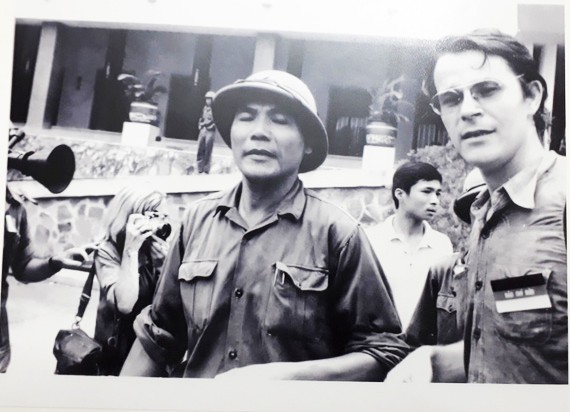 Society
Society


|
| Colonel Bùi Văn Tùng and an international correspondent at the Independence Palace on April 30, 1975. — File Photo |
Colonel Bùi Văn Tùng, one of the people who prepared the declaration of surrender for the President of the puppet regime in Sài Gòn Dương Văn Minh in 1975, died last week at the age of 94 at his home in HCM City’s District 3.
Colonel Tùng, former Political Commissar of the 203rd Tank Brigade, and the officers and soldiers of the 66th Regiment drafted and completed the declaration of surrender for Dương Văn Minh to read into the tape recorder to play on the radio.
The declaration of surrender read: “I, Dương Văn Minh, President of the Sài Gòn administration, call on the Army of the Republic of Vietnam to lay down their weapons and surrender unconditionally to the Liberation Army of South Vietnam. I declare the Sài Gòn administration, from the central to the local levels, completely dissolved. (The administration) from the central to local levels, is handed over to the Provisional Revolutionary Government of the Republic of South Vietnam.”
President Dương Văn Minh's declaration of acceptance of surrender was also drafted by Colonel Tùng and read directly on the radio.
Colonel Tùng also accepted this surrender on behalf of the Liberation Army, marking the end of the war in Việt Nam. After the country's unification, Colonel Tùng continued to work in the army until 1983, when he retired.
The colonel’s funeral was held at home modestly following his personal wishes. Memories of the colonel still stay in his family and other soldiers.
Tùng was born on February 4, 1930 in Hải Châu District, Đà Nẵng. In 1945, he joined the local self-defence and two years later joined the army to become a soldier, participating in two resistance wars against the French and the US.
The colonel, who was fluent in both French and Chinese, had extensive experience in several battles. He fought in Quảng Trị (now known as the tomb of tens of thousands of Vietnamese soldiers who sacrificed their lives for national liberation) and nearly died after being bombed.
He joined Hồ Chí Minh Campaign (April 1975), which ended the 21-year resistance war against the US, and headed to Sài Gòn, accepted the unconditional surrender of Sài Gòn administration. He also fought in the northern border defence war and then Cambodia.
After reunification, he held the position of Political Commissar of the 203rd Tank Brigade until 1980, worked as a lecturer at the National Defence Academy and retired in 1983. The Party and State awarded him the 75-year Party membership badge, the Second-class Military Merit Medal, and the First-class Anti-American Resistance War Medal.
According to his daughter Bùi Quỳnh Hoa, Colonel Tùng led a humble life. The city’s authority once offered to grant him a house, but he refused.
He once said there are still many who are obsessed with achievements.
“Fight and devote to the country. Don’t talk too much about what you have done but remember people who have fallen for the freedom and prosperity of our country today,” Hoa said, recalling her father’s words.
After the reunification, Tùng returned to his family in the North and spent time looking for the remains of his friends and soldiers who died in the wars.
One of his wishes was to write a book about his friends, soldiers and comrades who sacrificed so much for the country's liberation. His writing was published in newspapers, but his wish to publish a book remained incomplete.
In the mourning book, the Secretary of the HCM City Party's Committee wrote: “Colonel Bùi Văn Tùng was one of many officers and soldiers present at the Independence Palace during the historic moment, he was the person who drafted and completed the declaration of acceptance of surrender for President of the Republic of Vietnam Dương Văn Minh on the afternoon of April 30, 1975, a great feat and honour of the heroic Vietnamese People's Army and comrade Tùng personally. Farewell to Colonel Bùi Văn Tùng, a heroic example.” — VNS




